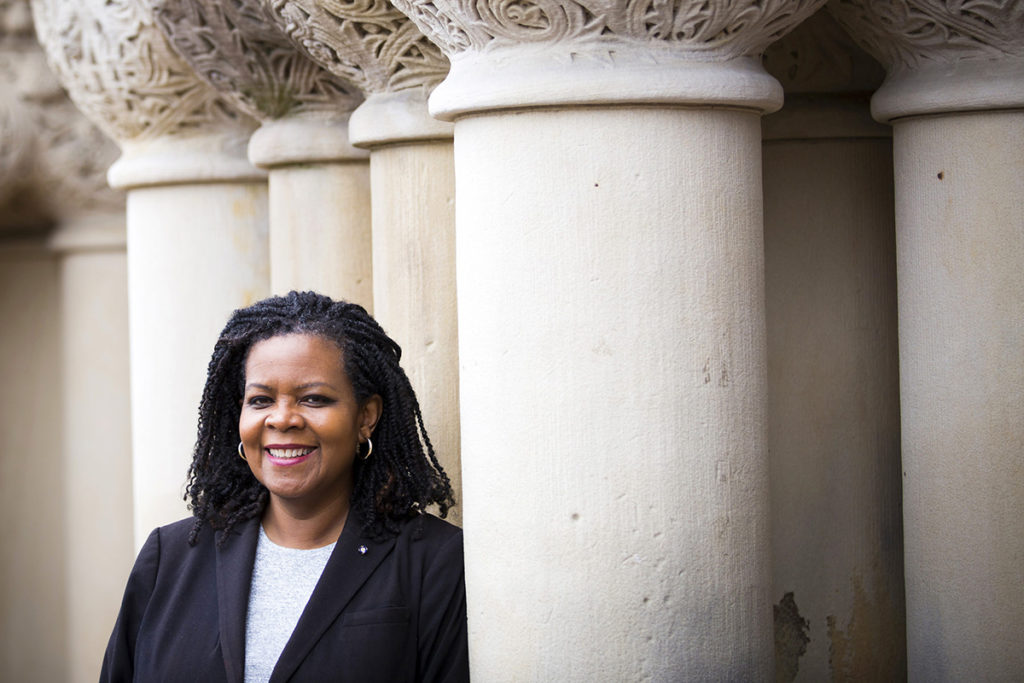Renowned historian recounts Jefferson-Hemings controversy for Clark audience

In late 1802, in the second year of Thomas Jefferson’s presidency, journalist and muckraker James Callender published several articles accusing the president of fathering a male child with an enslaved woman named Sally. As Jefferson’s stature as a key architect of the American Revolution grew in the decades after his death, rumors of the liaison were denied by his white descendants and ignored or discredited by most historians.
But in 1998, DNA findings published in the journal Nature (later corroborated independently by The Thomas Jefferson Foundation) confirmed the strong likelihood that Jefferson had fathered at least one child by his slave Sally Hemings. Callender’s prediction that their names would go down in history together was proved correct.
The year before the DNA results were released, the University of Virginia Press published “Thomas Jefferson and Sally Hemings: An American Controversy.” Its author, Annette Gordon-Reed, described the intellectual journey that led to its creation in a lecture titled “Jefferson and the Hemingses of Monticello,” held last month in Clark’s Higgins Lounge.
Gordon-Reed is the Charles Warren Professor of American Legal History at Harvard Law School and professor of history in the Faculty of Arts and Sciences at Harvard University. She is the recipient of a Pulitzer Prize for history, the National Book Award for Nonfiction, and a MacArthur Fellowship.
She explained that her fascination with Jefferson began in childhood, when she read a biography of him written for young people. She recalled being disturbed and perplexed at a seeming contradiction in his character: how he could own slaves even while writing “all men are created equal.”
In her early teens, Gordon-Reed learned of the Hemings family from, among other sources, Fawn Brodie’s 1974 biography “Thomas Jefferson: An Intimate History.” She said Brodie had included recollections dating from 1873 of two men, Madison Hemings and Israel Jefferson Gillette. Hemings claimed to be the son of Thomas Jefferson and Sally Hemings, while Gillette had been enslaved at Jefferson’s Monticello plantation before gaining his freedom and moving to Ohio.
Gordon-Reed found herself riveted by these testimonies — the first she had read by enslaved people — and their implications.
“The idea of your father not only being your father but the person who owned you — a person who could sell you if he wanted to, a person who had control of your life, much more than a regular father would have — I found it absolutely fascinating to think of that world,” she recalled.
Brodie’s book sparked, in Gordon-Reed’s words, “a firestorm,” and many historians denied the truth of the story. But having grown up in east Texas, Gordon-Reed says she knew that the idea of a slaveholder having a sexual relationship with a slave was plausible. In fact, she thought it odd that historians were resistant to the possibility, and decided it was because the slaveholder in question was Jefferson. She recalled that, even as an undergraduate at Dartmouth, she was dissuaded from writing a paper on the subject.
“The notion of who gets to pronounce a historical truth is very, very contested territory,” she said. “The heresy was believing black people.”
A graduate of Harvard Law School, Gordon-Reed used her legal training to analyze the credibility of allegations pointing to a liaison between Jefferson and Hemings and how those allegations had been actively discredited or simply ignored despite corroborating evidence. Her project, which began as an op-ed, mushroomed into her first book.
“When I went into this,” she said, “my real purpose was to talk about the way historians had handled the statements of African-American people in a situation where they were saying things about an important person. I think the lesson is bigger than just Thomas Jefferson and Sally Hemings. It’s about the writing of history, particularly the writing about slavery.
“Jefferson, more than any other member of the founding generation, can be a way to talk about race, slavery, politics, freedom of religion, gender — all the kinds of things that we are interested in now. He is a lens through which to view those matters, because more than any other member of the founding generation, particularly on the subject of race, he actually wrote about it.”
Until the 1990s, criticism of the founding fathers was not always well-received, Gordon-Reed said. She credited her recent co-author, University of Virginia historian Peter Onuf, as one of those responsible for creating a climate in the historical community where men like Jefferson could be recognized as imperfect human beings with flaws as well as virtues. As a result, she said, “People were ready to hear what I was saying when my book was published in 1997.”
Since then, Gordon-Reed has written two more books: “The Hemingses of Monticello: An American Family” (2008) and, with Onuf, “‘Most Blessed of the Patriarchs’: Thomas Jefferson and the Empire of the Imagination” (2016). Her current book project compares the life trajectories of Sally Hemings’ children, some of whom passed as white, while others remained in the black community.
Gordon-Reed concluded by explaining why she continues to explore the Jefferson-Hemings legacy.
“This story is of incredible importance to us in thinking about the history of race in this country, and the way history itself is written,” she said. “This country has never been just a white nation. It’s always been a nation of different people, different people who mix, different people who could not recognize each other across the color line, even if they had family ties. It’s a tragic story in lots of ways, but it’s an illuminating story.”
Gordon-Reed’s talk was offered as part of Clark University’s Higgins School of Humanities fall lecture series, “How Do We Know?” This event was also part of the African American Intellectual Culture Series and was co-sponsored by the Office of the Provost, Department of History, and the Center for Gender, Race and Area Studies.


